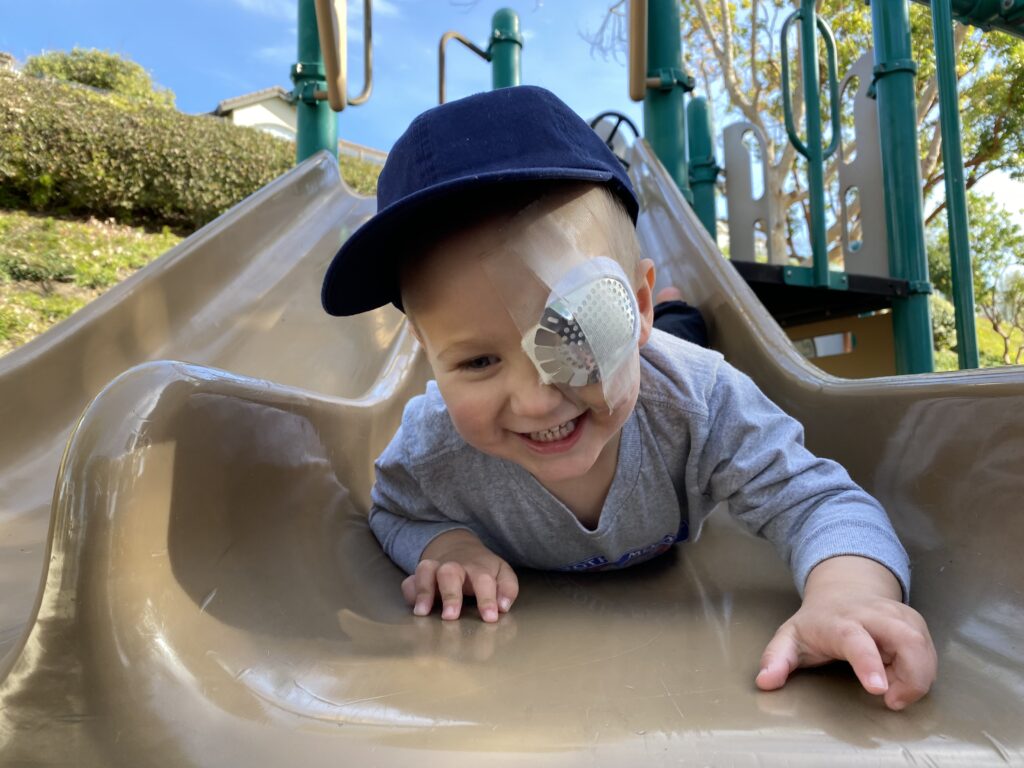Bill Thomas | October 22
Katie Taylor vividly remembers the first time she noticed her then two-year-old son, Clark, had developed a lazy eye. It was Friday afternoon on a holiday weekend and he’d just woken up from a nap. Clark’s doctor wouldn’t be in the office until Tuesday, so Katie spent the next few days worrying.
“Over the weekend, I looked at photographs we’d taken during the last several months, and I started noticing that his lazy eye had been there for a while. I hadn’t noticed it when I took the photos because it was so subtle, but when I looked closer I could see the signs were there,” Katie says.
“I started looking up information on the Internet and everything I read said it was fine. It said there was practically 0% chance that it was cancer, but I had a feeling in my gut. I knew it was cancer.”

When Katie was finally able to take Clark to the doctor, her worst fears were proven correct. Clark was diagnosed with retinoblastoma, a rare and aggressive form of pediatric eye cancer that can impair vision and sometimes spreads to the brain. This diagnosis was the first step in a long journey for Clark and his family, one that helped open Katie Taylor’s own eyes to the importance of pediatric cancer research.
Today, Clark is seven years old and cancer-free, and Katie serves on the board of directors for Pediatric Cancer Research Foundation. This year, she is chairing the 2025 Viva La Vida Gala on Saturday, Oct. 25, at Balboa Bay Resort in Newport Beach, CA. The black tie event is one of PCRF’s biggest tentpole fundraising efforts and a key part of our campaign to raise $25 million over the next five years to help fuel pediatric cancer research, ensure equitable care for all patients, and support mental health and survivorship.
The Difficulties of Pediatric Cancer Treatment During COVID
Ocular cancers can be tricky to treat, especially in young children, because of their close proximity to the brain. In addition to the danger of the disease spreading, the risk of high-toxicity treatments like chemotherapy and radiation therapy causing damage to the developing brain is a very real concern.
To mitigate the risk, Clark’s initial treatment plan utilized intra-arterial chemotherapy (IAC), a technique that allows doctors to treat hard-to-reach tumors while minimizing negative side effects. Unfortunately, no hospitals in Katie and Clark’s hometown of San Juan Capistrano, CA, had the means to offer such specialized treatment.
With their options limited by geography, the Taylors had no choice but to make frequent five-plus-hour drives to an IAC-equipped facility in Phoenix, AZ. Complicating matters further, Clark’s treatment coincided with COVID-19 lockdowns, limiting his family’s options when it came to food and lodging.
“We had to get an Airbnb in Phoenix because the hotels still weren’t open,” Katie recalls. “It was an odd time.”
Indeed, while traveling between California and Arizona, the Taylors often had to rely on drive-thrus and grocery delivery apps to keep themselves fed. They also discovered firsthand the realities of traveling five-and-a-half-hours with a two-year-old child without being able to stop and use public restrooms.

“On the bright side, there was pretty much zero traffic,” Katie says with a chuckle.
Katie can laugh now, but she admits it was much harder when she and her family were living through it. After multiple rounds of chemo with diminishing returns, the Taylors made the difficult choice of approving enucleation surgery to remove Clark’s cancer-affected eye. Now, at age 7, Clark wears a prosthetic eye and even Katie is surprised by how well he’s adjusted to life after cancer.
“The kids at school all know about it and he’ll talk to them about cancer and about why he has his special eye,” she says. “He’s very open about it. I think it helped make him a pretty confident kid.”
Building a Better Future for Pediatric Cancer Patients… Today
As arduous and emotional as the Taylors’ experience with childhood cancer was, Katie knows she and her family are very fortunate. Reflecting on the challenges they faced while receiving treatment during the COVID-19 lockdown, she is quick to acknowledge that many, many other families simply do not have the resources to overcome the inequities of pediatric cancer care.
That’s part of the reason why, when doctors approached Katie about including Clark in a pediatric cancer research study, she didn’t hesitate to say yes.
“They took a sample of fluid from where the tumor was inside his eye. The idea behind the study is to find out, if we had taken that sample before Clark had started chemo, could it have told us that chemo wasn’t going to work?” Katie says.
“Hopefully, in the future, this research will help other families in our position have fluid samples taken ahead of time that can determine what the best treatment is for them. They can go straight to surgery, if that’s what’s necessary, instead of having to worry about the potential side effects of going through chemo.”
For Katie, personalized care is the future of pediatric cancer care. For decades, childhood cancers have been treated with a one-size-fits-all approach, but recent breakthroughs are bringing us closer to a world where all patients are able to receive customized treatment plans tailored specifically to their unique healthcare needs.
Realizing that future, though, means ensuring innovative cancer researchers today have access to the resources they need to continue their work. With that in mind, Pediatric Cancer Research Foundation is undertaking its most ambitious fundraising campaign to date, with the goal of generating $25 million for childhood cancer research, equitable care, and mental health and survivorship support over the next five years.

One of PCRF’s biggest fundraising events is its annual black-tie gala. This year the event will be held on Saturday, Oct. 25, at Balboa Bay Resort in Newport Beach, CA, and will feature live entertainment courtesy of Billboard-charting country music artists Sixwire with special guest Mark McGrath of Sugar Ray. Katie Taylor is chairing the event, in a sense bringing things full circle.
“It’s funny, my husband and I went to the gala well before I thought about joining the board. It would have been the first gala after Clark went into remission. I didn’t really know anything about it and it turned out to be such an awesome experience. It’s a night to celebrate these kids and their families who have been through so much and are such inspirations. It’s also a night to reflect on all the hard work that’s been done and all the researchers and all the people at PCRF who are, day in and day out, doing everything they can to push things forward,” Katie says.
“The theme of the gala this year is Viva La Vida. It means ‘Long Live Life’ and I think that is exactly the right sentiment to sum up how excited I am about how Pediatric Cancer Research Foundation is helping these kids affected by cancers. It’s not just about treating their disease. It’s about giving them something to look forward to.”
If you would like to join us on Saturday, Oct. 25, at the 2025 Viva La Vida Gala at Balboa Bay Resort in Newport Beach, CA, click here to get tickets, purchase a table, secure a sponsorship, or make a donation today! To stay up-to-date with all the latest news shaping the future of pediatric cancer treatment, don’t forget to follow Pediatric Cancer Research Foundation’s Profectus Blog!

